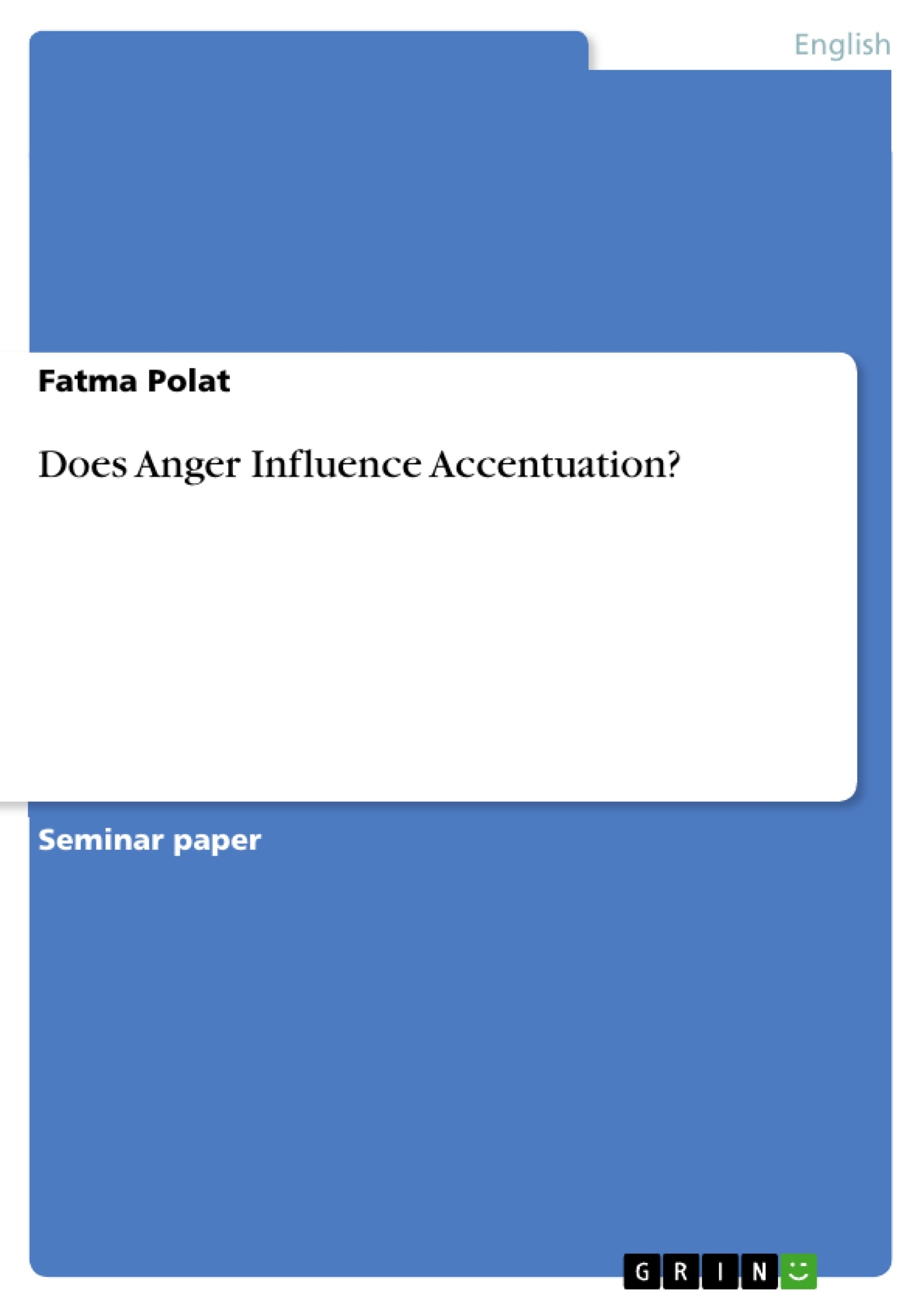In linguistics, there are only few studies that investigate the correlation between emotion and language since language and cognition were treated as autonomous systems. One of the few books that puts an emphasis on this topic and analyses it in detail is Monika Schwarz-Friesel’s "Sprache und Emotion" published in 2012.
The paper proves that in some situations, anger definitely influences accentuation. Hence, epithets which behave like a pronoun and therefore refer to a previously mentioned DP are accentuated in many cases, since it was uttered by an angry person.
People are loving, suffering, and reflective human beings, because they have feelings. Emotions and feelings are reflected in all areas of existential human experience. With language, we express our subjective feelings. Thus, the relation between language and emotion is an important phenomenon, especially in the interpretation of the mediated. This area, however, has been excluded for long from linguistics and cognitive science investigation because they saw language and cognition as autonomous systems that were not heavily influenced by emotions.
However, it is generally believed that the universal ability to primary emotions are innate. Basic emotions, such as happiness, anger, disgust, fear, contempt, and sadness can be recognized and expressed by people in all cultures. These emotions occur relatively short and intense
.
For some years now, as Schwarz-Friesel describes, there is an “emotional turn“ (ibid.). Emotions are now regarded as determinative parts of cognitive states and processes. Particularly in the area of language processing —both production and reception of linguistic utterances— shows the influence of language on cognitive processes (cf. Schwarz-Friesel 2 ff.). With (linguistic) utterances, emotions are expressed and named, aroused or intensified (cf. Schwarz-Friesel 6).
In this paper, I want to investigate the following hypothesis: When a speaker is angry, s/he puts an emphasis not only on the verb but also on the epithet which has a negative connotation (e.g. masseur - torturer) or even is an insult (e.g. boss - idiot). Hence, the aim of this paper is to show that in selected examples, the referential DP (the epithet), which is already given, is stressed.
Inhaltsverzeichnis (Table of Contents)
- Abstract
- 1. Introduction
- 2. Theoretical Approaches/ Studies on focus
- 2.1. Basic Notions of Information Structure, Manfred Krifka (2008)
- 2.2. Types of Focus in English, Carlos Gussenhoven (2008)
- 2.3. Givenness, AvoidF and Other Constraints on the Placement of Accent, Roger Schwarzschild (1999)
- 2.4. Sprache und Emotion, Monika Schwarz-Friesel (2012)
- 3. Empirical Investigation
- 3.1. Hypothesis
- 3.2. Design
- 3.3. Results and Evaluation
- 4. Conclusion
Zielsetzung und Themenschwerpunkte (Objectives and Key Themes)
This paper aims to demonstrate the influence of anger on accentuation. The main goal is to prove that, in certain situations, anger can lead to a speaker emphasizing epithets with negative connotations or insults, even though they refer to previously mentioned entities. This study will focus on the interplay between emotions and language, challenging the traditional view of language as an autonomous system.
- The relationship between anger and accentuation in language
- The role of epithets and their negative evaluative components in accentuation
- The concept of givenness and its relevance to accent placement
- The influence of emotions on cognitive processes, particularly in language production and reception
- The historical shift from viewing language as autonomous to recognizing the influence of emotions
Zusammenfassung der Kapitel (Chapter Summaries)
- Abstract: This chapter introduces the paper's focus on investigating the correlation between anger and accentuation in language. It highlights the limited research in this field and cites Monika Schwarz-Friesel's "Sprache und Emotion" as a key resource for understanding the interplay between emotions and language.
- Introduction: This chapter provides a general overview of the paper's topic, emphasizing the importance of emotions in human experience and their reflection in language. It delves into the historical exclusion of emotions from linguistic and cognitive studies, highlighting the recent shift towards recognizing the significance of emotions in cognitive processes, particularly in language production and reception.
Schlüsselwörter (Keywords)
The paper centers on the intersection of emotions and language, specifically focusing on the influence of anger on accentuation. Key concepts include epithets, givenness, information structure, and the relationship between language and cognition. The study draws on existing research, particularly from Monika Schwarz-Friesel's "Sprache und Emotion," which explores the emotional turn in linguistics and cognitive science.
Frequently Asked Questions
Does anger influence how we emphasize words?
Yes, the paper argues that when a speaker is angry, they often put a strong emphasis (accentuation) on epithets or insults, even if they refer to someone already mentioned.
What is an "epithet" in the context of this study?
In this linguistic study, an epithet is a descriptive term or insult (e.g., calling a boss an "idiot") that refers back to a previously mentioned person.
Why was the link between emotion and language ignored for so long?
Traditionally, linguistics and cognitive science viewed language and cognition as autonomous systems that were not considered to be heavily influenced by subjective emotions.
What is the "emotional turn" in linguistics?
It refers to a recent shift where emotions are recognized as determinative parts of cognitive processes, including the production and reception of speech.
What are "primary emotions" according to the text?
Primary emotions like happiness, anger, fear, and sadness are considered innate and universal, recognizable across all human cultures.
- Citar trabajo
- Fatma Polat (Autor), 2016, Does Anger Influence Accentuation?, Múnich, GRIN Verlag, https://www.grin.com/document/337967



